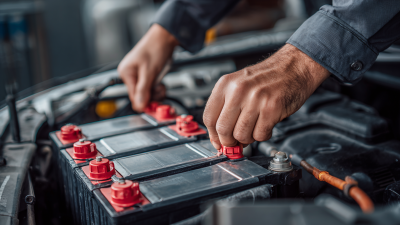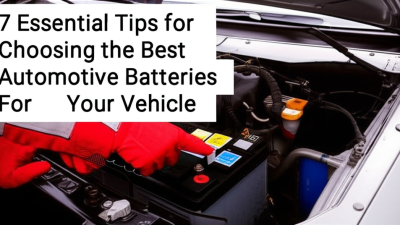Your Ultimate Guide: How to Buy a Car Battery Like a Pro for International Shipping
As the automotive industry continually evolves, the demand for high-quality car batteries remains vital, particularly for international shipping. According to a recent report by the Global Battery Alliance, the global battery market is expected to reach a valuation of approximately $120 billion by 2030, showcasing a significant upward trend. This growth underscores the importance of understanding how to Buy A Car Battery efficiently, especially in a global context where shipping regulations and market variations come into play. Ensuring that the right battery is selected not only enhances vehicle performance but also contributes to eco-friendly practices through the adoption of advanced technology and sustainable sourcing. In this ultimate guide, we will navigate the intricacies of purchasing car batteries for international shipping like a pro, making the process seamless and informed.

Selecting the Right Car Battery for International Shipping Needs
When selecting the right car battery for international shipping, it’s crucial to understand the specific requirements and regulations of both the origin and destination countries. According to the International Organization for Standardization (ISO), proper classification and labeling of battery types can significantly reduce shipping risks and compliance issues. Lead-acid batteries, for example, must comply with the UN 2794 classification when being shipped to ensure safe transport across borders.
**Tip:** Before purchasing, check the battery specifications against the destination country's customs regulations. Many countries have strict guidelines on hazardous materials, and failure to comply can lead to delays or additional charges.
Additionally, consider the climate of the destination. Extreme temperatures can affect battery performance. The Battery Council International indicates that extreme heat can lead to accelerated evaporation of the electrolyte in lead-acid batteries, while cold temperatures can impede the battery's ability to hold a charge. Thus, selecting a battery designed for the specific climate conditions of the destination is essential.
**Tip:** Opt for batteries specifically rated for high or low temperatures when shipping to varied climates to ensure reliability upon arrival. This foresight will save you headaches and additional costs in the long run.
Understanding Battery Types and Their Specifications for Global Shipping
When purchasing a car battery for international shipping, it's crucial to understand the various battery types and their specifications. Lead-acid batteries are the most common type used in vehicles. They come in two main categories: flooded and sealed. Flooded batteries require maintenance and are more affordable, while sealed batteries, such as AGM (Absorbed Glass Mat) and gel batteries, offer better performance and longer life but at a higher cost. Knowing these differences will help you select the right type for your vehicle's needs and ensure safe transportation.
In addition to battery types, pay close attention to specifications like voltage, capacity (measured in ampere-hours, or Ah), and terminal types. A standard car battery typically operates at 12 volts, but high-performance vehicles may require a battery with a higher voltage or specific capacity for enhanced power. Furthermore, checking the International Air Transport Association (IATA) regulations regarding shipping batteries is vital, as regulations may vary across countries. By understanding these essential factors, you can become an informed buyer and navigate the complexities of international shipping effectively.
Best Practices for Packaging Car Batteries for International Transport
When shipping car batteries internationally, proper packaging is paramount to ensure safety and compliance with regulations. Start by selecting a sturdy, acid-resistant container that can withstand the rigors of transit. Use a box that is specifically designed for hazardous materials, ensuring it has proper labeling and warning signs on the outside. This helps inform handlers of the contents and highlights the need for careful handling.
Next, secure the battery within the box using cushioning materials, such as bubble wrap or foam inserts, to prevent movement during transportation. It’s essential to disconnect and cap the battery terminals to prevent short circuits and leakage, which can be dangerous. Additionally, consider using a double-boxing method, where the inner box is placed inside a larger outer box for added protection. By following these best practices, you can minimize risks associated with international shipping of car batteries and ensure they arrive safely at their destination.

Navigating Customs Regulations When Shipping Car Batteries Abroad
When shipping car batteries internationally, understanding customs regulations is paramount to ensuring a smooth transaction. According to a report by the International Council on Clean Transportation (ICCT), the global demand for electric vehicle batteries has surged by over 50% in the last three years, leading to stricter international shipping regulations. Countries like the United States and members of the European Union mandate that lithium batteries meet specific safety standards and labeling requirements to minimize risks during transport.
In addition, the United Nations has established guidelines under the Dangerous Goods Regulations (DGR) that classify car batteries, particularly lithium-ion variants, as hazardous materials. This means that shippers must comply with special packaging, marking, and documentation procedures, ensuring that packages are transported in accordance with IATA and DOT regulations. Failure to adhere to these requirements can result in delayed shipments, hefty fines, or even the return of goods. Thus, engaging with a shipping service that specializes in hazardous materials is advisable for a seamless battery import or export process.
Your Ultimate Guide: How to Buy a Car Battery Like a Pro for International Shipping
| Battery Type | Specifications | Weight (lbs) | Customs Regulations | Estimated Shipping Time (days) |
|---|---|---|---|---|
| Lead-Acid | 12V, 80Ah | 50 | Class 8 hazardous material | 10-14 |
| AGM | 12V, 90Ah | 55 | Regulated as non-spillable | 7-10 |
| Lithium-Ion | 12V, 100Ah | 30 | Class 9 hazardous material | 5-8 |
| Gel Cell | 12V, 75Ah | 48 | Regulated as non-spillable | 7-12 |
Tips for Finding Reliable Suppliers for International Car Battery Orders
When it comes to sourcing car batteries for international shipping, finding reliable suppliers is crucial. Start by researching reputable suppliers who specialize in automotive parts. Look for companies with a strong reputation and positive reviews, as these factors often indicate reliability. Utilize online platforms dedicated to auto parts where suppliers are vetted for quality. Pay attention to suppliers that offer comprehensive product descriptions and clear warranty information, as this can protect against defects or issues during international shipment.

Another effective strategy is to connect with dropshipping networks focused on auto parts. Many of these platforms provide access to a variety of suppliers, allowing you to compare prices and product availability. Additionally, investigate the suppliers' shipping capabilities, including their experience with international logistics, which can significantly impact your order's delivery times and costs. By leveraging these resources and relationships, you will position yourself to purchase car batteries like a pro, ensuring that you get value for your money while minimizing risks associated with international orders.
Related Posts
-

Understanding After Sales Service Benefits and Cost of Repair for Best Car Battery Purchase
-

10 Best Tips to Save on New Car Battery Costs
-

Exploring the Best Boat Batteries on the Market for Your Maritime Needs
-

Innovative Uses of Boat Batteries in Marine Operations and Beyond
-

Navigating the Future of Marine Power 2025 Insights on Best Boat Batteries
-

7 Essential Tips for Choosing the Best Automotive Batteries for Your Vehicle
